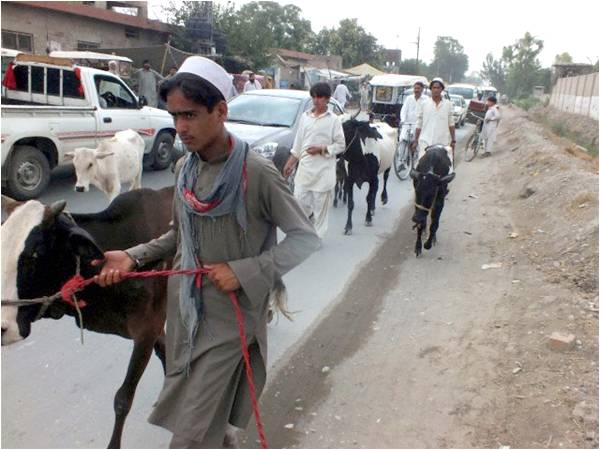
Amid the military operation in North Waziristan, about 10,000 families from Mirali and Miranshah have fled their homes to settle in the Borikhail village of the Garizo district of Afghanistan’s Khost province. Their camp is called Gulan, or flowers.
The UNHCR is helping the local authorities register and assist the refugees. As part of a UN inter-agency response, it says it is ready to help the displaced people inside Pakistan as well. “They have trekked the mountainous terrains across Pakistan’s border to seek safety,” said Adrian Edwards, a UNHCR spokesman. “People are being accommodated with local Afghan communities for now. However, Afghan hosting communities have limited absorption capacity and resources. The urgent needs include shelter, clean drinking water and sanitation.”
He said the UNHCR was concerned that families close to conflict-affected areas would be further exposed to violence and humanitarian access could be limited.
“The people of Waziristan had no option but to flee,” said Muhammad Wali, waiting in line for registration. “The fight between the military and militants is not a new one. And people know that if they stay they will suffer a lot.” He was skeptical of the operation, and said most of the casualties would be civilian. “They cannot differentiate between a house and militant hideout.”
Mubariz Zadran, spokesman to the Khost governor, said there were about 50,000 men, women and children like Muhammad Wali, who were being registered in line with UNHCR rules, by two commissions. “Afghanistan has a crystal clear policy against terrorism,” he said. “We have ourselves suffered at the hands of terrorists.”
There are concerns among the Pakistani military that a number of militants might also flee the area, hiding among the displaced families, and reach Afghanistan. Zadran says the local authorities were ensuring they did not settle any militants. “The people coming from Waziristan are monitored and filtered by our security teams as well as UNHCR,” he said. “But it is our obligation to respect human rights.”
Many refugees say the journey to Bannu might have been harder for them, especially because of the extreme weather in the middle of summer. “The weather in Khost is like the weather in North Waziristan,” said Haji Shaista Gul Dawar. Irfan Ashraf, a doctoral fellow at Southern Illinois University, says vacating and displacing the civilian population for a military operation, as seen in Swat previously, may not work. Irfan reported on the Swat operation of 2009 for international organizations. “This approach is helping militants more than the military,” he said. “This is what the militants want. Al Qaeda wanted America to intervene this way in Afghanistan and has won more than it could lose.”
The fallout of the displacement, he said, could worsen the situation in the long term.
The UNHCR is helping the local authorities register and assist the refugees. As part of a UN inter-agency response, it says it is ready to help the displaced people inside Pakistan as well. “They have trekked the mountainous terrains across Pakistan’s border to seek safety,” said Adrian Edwards, a UNHCR spokesman. “People are being accommodated with local Afghan communities for now. However, Afghan hosting communities have limited absorption capacity and resources. The urgent needs include shelter, clean drinking water and sanitation.”
He said the UNHCR was concerned that families close to conflict-affected areas would be further exposed to violence and humanitarian access could be limited.
“The people of Waziristan had no option but to flee,” said Muhammad Wali, waiting in line for registration. “The fight between the military and militants is not a new one. And people know that if they stay they will suffer a lot.” He was skeptical of the operation, and said most of the casualties would be civilian. “They cannot differentiate between a house and militant hideout.”
Mubariz Zadran, spokesman to the Khost governor, said there were about 50,000 men, women and children like Muhammad Wali, who were being registered in line with UNHCR rules, by two commissions. “Afghanistan has a crystal clear policy against terrorism,” he said. “We have ourselves suffered at the hands of terrorists.”
There are concerns among the Pakistani military that a number of militants might also flee the area, hiding among the displaced families, and reach Afghanistan. Zadran says the local authorities were ensuring they did not settle any militants. “The people coming from Waziristan are monitored and filtered by our security teams as well as UNHCR,” he said. “But it is our obligation to respect human rights.”
Many refugees say the journey to Bannu might have been harder for them, especially because of the extreme weather in the middle of summer. “The weather in Khost is like the weather in North Waziristan,” said Haji Shaista Gul Dawar. Irfan Ashraf, a doctoral fellow at Southern Illinois University, says vacating and displacing the civilian population for a military operation, as seen in Swat previously, may not work. Irfan reported on the Swat operation of 2009 for international organizations. “This approach is helping militants more than the military,” he said. “This is what the militants want. Al Qaeda wanted America to intervene this way in Afghanistan and has won more than it could lose.”
The fallout of the displacement, he said, could worsen the situation in the long term.

